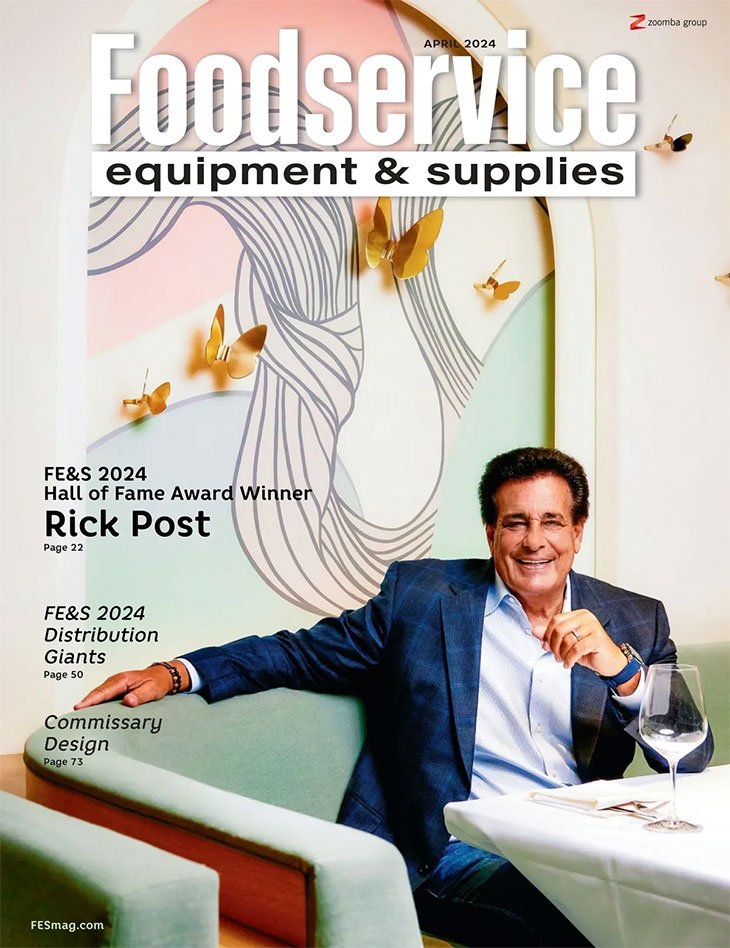Display Prep, Small Plates and Sustainability All Star at a New Res-Hall Restaurant
 At the Mongolian barbecue station, staff members working at the five-foot-diameter grill prepare customized stir-fries, noodle bowls and other flattop-friendly items fresh to order.The 600 students living in the new $62 million 17th Ave. Residence Hall at the University of Minnesota (U of MN) are just an elevator ride away from campus foodservice heaven: Stir-fries prepared to order on a Mongolian grill. Hearth-baked pizza and pasta. Gluten-free, allergen-free, vegan and vegetarian options. Grilled sandwiches. A deli, an abundant salad bar, and a fresh produce market. Fun, unexpected "pop up" stations for featured items like chocolate chip cookie milkshakes and local apples cut to order and served with caramel dipping sauce.
At the Mongolian barbecue station, staff members working at the five-foot-diameter grill prepare customized stir-fries, noodle bowls and other flattop-friendly items fresh to order.The 600 students living in the new $62 million 17th Ave. Residence Hall at the University of Minnesota (U of MN) are just an elevator ride away from campus foodservice heaven: Stir-fries prepared to order on a Mongolian grill. Hearth-baked pizza and pasta. Gluten-free, allergen-free, vegan and vegetarian options. Grilled sandwiches. A deli, an abundant salad bar, and a fresh produce market. Fun, unexpected "pop up" stations for featured items like chocolate chip cookie milkshakes and local apples cut to order and served with caramel dipping sauce.
A beautifully designed, contemporary, sustainable Marché environment houses all of this and much more along with flexible seating for different dining, studying and socializing occasions.
The Fresh Food Company serves as the new hall's showpiece restaurant. Managed by Aramark Higher Education, it's the school's first nontraditional dining center and, according to Karen DeVet, senior resident district manager for Aramark at U of MN, it's been a big hit since its opening last fall.
"Our existing residence halls offer traditional dining centers with the majority of production positioned in the back of the house and service points out front," DeVet says. "Fresh Food Company is different in that everything is done in front. We've turned the concept of dining hall inside out so that everything is done to order in front of the guest. There's no back-of-the-house prep, per se, so it's significantly different. We've had great response from the residents as well as from other students and staff, who walk from all over campus — even during the Minnesota winter — to come here. It's been very, very positive."
The Fresh Food Company takes up one corner of the L-shaped residence hall and sits on street level along Fourth Ave. in Minneapolis. An external entrance provides easy access for students and others who don't live in the hall, while a separate internal, card-swipe entrance ensures security for residents. The long and rectangular space measures roughly 9,100 square feet and provides seating for 350. Depending on their mood or the dining occasion, students can choose from among counter seats along the windows, booths, high-tops, communal tables that accommodate large groups, and freestanding two-, four- and six-top tables. All seating is interspersed around the cooking stations to create a dynamic environment that integrates dining and community.
While Aramark has installed its Fresh Food Company open-kitchen Marché concept at a handful of other campuses around the nation, each is customized to its location with signature design features and menu options. At U of MN, a premier feature of the building's lobby at the entrance to the restaurant is a striking wall of reclaimed Twin Cities wood crafted by a locally owned woodworking company. "It's the first thing you see as you enter the hall, and it's a beautiful feature," DeVet comments. "It's designed to promote a sense of sustainability, as are a lot of the furnishings and equipment that were spec'd for this particular location. All of the tabletops are made from recycled materials."
Indeed, the entire building incorporates multiple sustainable design features to enable it to achieve LEED Silver designation. They include extensive use of regionally sourced materials, heat-recovery mechanical systems, high-efficiency plumbing and lighting fixtures, a vegetated roof and a water reclamation system. Fresh Food Company uses low-volume exhaust hoods in conjunction with a variable-speed demand-control exhaust system, as well as a heat-recovery option for the flight-type dishmachine. Energy Star-compliant equipment, such as reach-in refrigeration, ice makers, cooking equipment and dishmachines are part of the equipment package as well.
Where the operation really shines, however, is out on the floor at the multiple self-contained exhibition cooking stations. They start with what DeVet says is a consistent feature of all Fresh Food Company restaurants, the produce market. It's the first station guests see upon entry, and it sets the tone for the concept in vibrant fashion.
Loaded with colorful fresh fruits and vegetables, it includes a full salad bar with a variety of toppings as well as composed salads with meat and nonmeat protein sources. Staff is right out front, prepping and chopping fresh fruits and vegetables throughout the day. The station also includes a small exhibition space. "We like to use that for surprise pop-up offerings, like specialty milkshakes or caramel apples," DeVet says. "The students really love those events, especially because there's always a staff member there interacting with them and preparing the items fresh."
Another much-loved station, positioned toward the rear of the facility is the Mongolian barbecue. There, staff members working at the impressive five-foot-diameter grill prepare customized stir-fries, noodle bowls and other flattop-friendly items fresh to order. "We chose to go with the Mongolian grill as one of our concepts because it's so unique," DeVet says. "It's really a great focal point in the venue."
The operation also features a separate grill station that rotates in traditional burgers and fries, as well as other best-sellers such as open-faced grilled salmon BLT sandwiches; a "home" station featuring center-of-the-plate meat entrées and sides; a dedicated vegetarian station; and an oven station with a sauté component.
She adds that a unique and popular aspect of the operation is its small-plates approach, offered at all stations. Students who want just a half-order of something from the grill, for instance, can get it and then try a half-order from another station to complete their meals — or simply eat lighter. "We've found it's a great way to encourage the students to try different flavors and sample dishes from all of the stations throughout the facility," DeVet says.
The Fresh Food Company operates from 7 a.m. to 9 p.m. seven days a week on a three-week menu cycle, and most menu selections change daily. As such, the operation does not have any permanent menu signage. Rather, the Fresh Food Company uses small countertop menu signage that staff can easily change for each meal period. It lists the menu item, ingredients and basic nutritional information.
Offering such diverse and constantly changing menus is made possible by the operation's highly flexible, state-of-the-art equipment, DeVet says. "One of the things that we did in this location, which is pretty cool, is to make sure that we have ultimate flexibility with our stations and equipment. That was very intentionally designed in. We can easily move the sauté station or the conveyor oven or the flattop grill from one station to the next, and that enables us to create a tremendous amount of variety. We didn't want each station to be locked in to serving the same items day in and day out; we wanted to always be able to keep it fresh, and this type of plug-and-play equipment helps us to do that."
For a complete list of our 2014 College and University Foodservice Innovators click here.
Snapshot
- No. of students: 38,767 full-time; 12,759 part-time
- Operation: Aramark Higher Education
- Meal plan participants: 5,815 mandatory plans, 756 voluntary plans
- Dining locations: 7 residential restaurants, 12 coffee/cafés, 5 c-stores, 24 food court/retail restaurants
- Total campus transactions: 123,000 per week
- Total dining employees: 935 employees
Key Players
- Karen DeVet, senior resident district manager, Aramark at Minnesota
- Leslie Bowman, executive director, contract administration
- Laurie McLaughlin, director, housing and residential life
- Design/Foodservice Consultant: Robert Rippe & Associates




